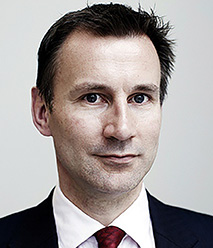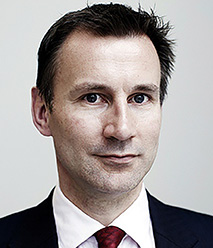 To mark the 60th anniversary of legal aid, the Law Society is conducting a review into the provision of publicly-funded criminal and civil legal services in England and Wales.
To mark the 60th anniversary of legal aid, the Law Society is conducting a review into the provision of publicly-funded criminal and civil legal services in England and Wales.
 To mark the 60th anniversary of legal aid, the Law Society is conducting a review into the provision of publicly-funded criminal and civil legal services in England and Wales.
To mark the 60th anniversary of legal aid, the Law Society is conducting a review into the provision of publicly-funded criminal and civil legal services in England and Wales.
 Health Secretary Jeremy Hunt has accepted the findings of Professor Sir Norman Williams’s review of the use of manslaughter gross negligence charges against doctors. The review was commissioned by Mr Hunt in February, prompted by the conviction of Dr Hadiza Bawa-Garba following the death in 2011 of a six-year-old boy in Leicester.
Health Secretary Jeremy Hunt has accepted the findings of Professor Sir Norman Williams’s review of the use of manslaughter gross negligence charges against doctors. The review was commissioned by Mr Hunt in February, prompted by the conviction of Dr Hadiza Bawa-Garba following the death in 2011 of a six-year-old boy in Leicester.
The conviction caused an international furore, with the president of the Australian Medical Association in New South Wales commenting: “How on earth was the doctor convicted of manslaughter? We don’t understand it.”
 Confirmation that Health Secretary Jeremy Hunt is to launch an initiative to reduce prescribing and medication errors in the NHS was met with a mixed response from bodies representing the pharmacy sector.
Confirmation that Health Secretary Jeremy Hunt is to launch an initiative to reduce prescribing and medication errors in the NHS was met with a mixed response from bodies representing the pharmacy sector.
The move was confirmed by Pharmacy Minister Steve Brine MP in his speech to the Royal Pharmaceutical Society’s annual conference in September. Mr Brine said that studies currently indicate that up to 8% of prescriptions have a mistake in dosage level, course length or medication type.
He said: “Patient education and safe management of information will be at the heart of our efforts to tackle this serious issue. For example, we will need to improve how we use electronic prescribing, as well as how we transfer information about medicines between care settings, where there is significant scope for errors.”
 New Government proposals for fixing legal fees in medical negligence cases have been given a cautious welcome by lawyers.
New Government proposals for fixing legal fees in medical negligence cases have been given a cautious welcome by lawyers.
The proposals, currently out to consultation, are for a fixed cap on all clinical negligence cases up to £25,000. The aim, says the Department of Health, is to prevent rising litigation costs within the NHS. Currently, there is no limit on legal costs that can be recouped. It is expected the new cap will save the NHS up to £45m a year.
The department cites an instance where costs of £83,000 were claimed for a case in which the patient was awarded £1,000. The total bill for the NHS was £1.5bn in the financial year 2015-16.
Announcing the proposals, Health Secretary Jeremy Hunt (pictured) said: “It’s important that, when significant mistakes happen in the NHS, patients are able to have an open dialogue with a trust about what went wrong, receive reassurance of what is being learnt and can discuss what form of recompense or redress may be appropriate. Legal action should only be one part of this process.
 In may the annual conference of the Association of Personal Injury Lawyers was addressed by Lord Faulks, then minister at the Department of Justice (pictured). Among the subjects of his address was an appraisal of the first year of operation of MedCo, the body set up by the government to facilitate the sourcing of medical reports in soft tissue injury claims brought under the MoJ’s new Pre-Action Protocol for Low Value Personal Injury Claims in Road Traffic Accidents.
In may the annual conference of the Association of Personal Injury Lawyers was addressed by Lord Faulks, then minister at the Department of Justice (pictured). Among the subjects of his address was an appraisal of the first year of operation of MedCo, the body set up by the government to facilitate the sourcing of medical reports in soft tissue injury claims brought under the MoJ’s new Pre-Action Protocol for Low Value Personal Injury Claims in Road Traffic Accidents.
Lord Faulks said: “The new portal introduces much needed independence and breaks the financial links between the solicitors who request medical reports and the medical experts and organisations who provide them. MedCo is also about improving the quality of reports and is introducing a robust new accreditation scheme for medical experts.”